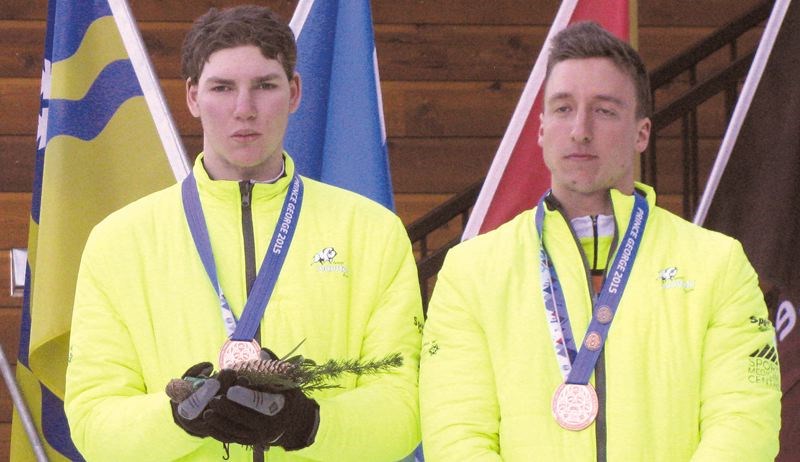A conversation with blind cross country skier Jesse Bachinsky is also one with his guide, Brendan McDonald.
The two skied to bronze Tuesday in the 1.2-kilometre classic standing sprint, their first medal of the Canada Winter Games for Team Manitoba. They came in fourth at Monday's 2.5km classic standing event.
"I wasn't going for any medals, just for the fun of it," said a beaming Bachinsky after his moment on the podium.
The two finish each other's sentences despite just joining together last summer. After months of dryland training, gym work, and skiing three times a week, they've developed a back-and-forth dynamic on and off the slopes.
"You're going to develop a bond for sure," said McDonald, 25, of all that time spent together.
The 16-year-old Bachinsky, who first started cross country skiing last year, says it's hard to explain how he moves through the course.
"I think a lot of it is based on sound and feel. With the skis more in the track, you have to really be able to feel it if you can't see it," said Bachinsky.
"I kind of see colour and see shapes."
"What colour's the best?" interjected McDonald.
"Yellow," Bachinsky answered.
"Which we were so fortunate for," said McDonald, pointing to their glaring neon yellow jackets that tells spectators Team Manitoba is in the room. "It totally worked out, our suit is pretty much the entire colour."
That way Bachinsky could make out McDonald's shape on the slopes at Otway Nordic Centre.
"It's interesting," McDonald added. "It's really hard to explain but it's a lot of communication from one another and it's also us setting tempos together and him trusting me, really."
"I totally trust you," Bachinsky said quickly.
The key is the communication, like when McDonald gives Bachinsky the verbal signal to change from a double pull to diagonal stride or get ready for a corner, an incline or a downhill.
"I'll tell him we'll be transitioning in 'Three, two, one.' And on that one cue he'll start diagonally striding up the hill."
Bachinsky tries to focus only on McDonald's voice, even with the sounds of spectators and other athletes. McDonald usually stays about five feet ahead of Bachinsky, but on hills he'll stretch that space separating them.
"I have to keep constantly checking my shoulder. He communicates with me too but I have to be aware of where I'm going and also where he is going so I can maintain a distance."
McDonald said Bachinsky has a knack for the sport.
"My coach came up to me and she needed someone to guide for him because there was nobody fast enough for him yet," he said. "He'll catch me and if I slow down too soon, he'll go right by me."
That's happened before, but not on purpose.
"I fell letting someone pass," said McDonald. "I told Jesse to keep going. This was before an intersection that we were practicing constantly because it was a sharp, sharp turn."
"I passed him," said Bachinsky, laughing.
Added McDonald, a little ruefully: "I let a blind skier go around a sharp corner that I was afraid of from the beginning."
But fear of the hills is a foreign concept to Bachinsky, who has been snowboarding steep runs since he was nine years old.
"I just went out and taught myself," he said of starting that sport.
On the drive from his hometown in Kenora, Ont. - which is about a two-hour drive from his Winnipeg training centre - the family stopped at Sunshine Village Ski Resort in Banff where Bachinsky skied double black diamonds.
"I've had a lot of good tips."
It's an approach he takes to his daily life. Bachinsky doesn't use a seeing-eye dog or a walking stick.
"I just kind of wing it," says Bachinsky, who also uses sound and spatial cues in his environment. "I can kind of follow by sound. If I can't see something, I can hear it."
It's his love of speed that prompted an exchange between the teammates:
"What's your favourite part?" asked McDonald.
"Racing."
"But on the course too? You love to go fast."
"I love to go fast," Bachinsky agreed. "The downhills are wicked."
Next, Bachinsky is headed to nationals in Thunder Bay, Ont.
"I think right now it might be one step at a time," he said to shouts of 'gold' in the background from teammates.



